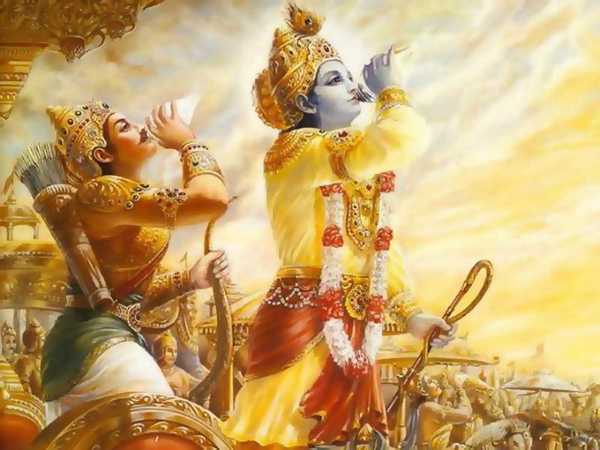Chapter 88

“Dhaumya continued, ‘Listen, O Bharata, I shall now narrate to thee indetail according to my knowledge, the sacred tirthas of the south. Inthat quarter lieth the sacred and auspicious river Godavari, full ofwater abounding in groves and frequented by ascetics. In that directionalso are the rivers Venna and Bhimarathi, both capable of destroying sinand fear, and abounding in birds and deer, and graced with abodes ofascetics. In that region also, O bull of the Bharata race, is the tirthaof the royal ascetic, Nriga viz., the river Payoshni, which is delightfuland full of waters and visited by Brahmanas. There the illustriousMarkandeya, of high ascetic merit sang the praises in verse of kingNriga’s line! We have heard respecting the sacrificing king Nriga thatwhich really took place while he was performing a sacrifice in theexcellent tirtha called Varaha on the Payoshni. In that sacrifice Indrabecame intoxicated with quaffing the Soma, and the Brahmanas, with thegifts they received. The water of the Payoshni, taken up (in vessel), orflowing along the ground, or conveyed by the wind, can cleanse a personfrom whatever sins he may commit till the day of his death. Higher thanheaven itself, and pure, and created and bestowed by the trident-bearinggod, there in that tirtha is an image of Mahadeva beholding which amortal goeth to the region of Siva. Placing on one scale Ganga and theother rivers with their waters, and on the other, the Payoshni, thelatter, in my opinion would be superior to all the tirthas, together, inpoint of merit! Then, O foremost of the Bharata race, on the mountaincalled Varunasrotasa is the sacred and auspicious wood of Matharaabounding in fruits and roots, and containing a sacrificial stake. Then,O king, it is said that in the region on the north of the Praveni, andabout the sacred asylum of Kanwa, are many woody retreats of ascetics.And, O child, in the tirtha called Surparaka are two sacrificialplatforms of the illustrious Jamadagni, called Pashana and Punaschandra,O Bharata! And, O son of Kunti, in that spot is the tirtha called Asokaabounding in woody retreats of ascetics. And, O Yudhishthira, in thecountry of the Pandyas are the tirthas named Agastya and Varuna! And, Obull among men, there, amongst the Pandavas, is the tirtha called theKumaris. Listen, O son of Kunti, I shall now describe Tamraparni. In thatasylum the gods had undergone penances impelled by the desire ofobtaining salvation. In that region also is the lake of Gokarna which iscelebrated over the three worlds, hath an abundance of cool waters, andis sacred, auspicious, and capable, O child, of producing great merit.That lake is extremely difficult of access to men of unpurified souls.Near to that tirtha is the sacred asylum of Agastya’s disciple, themountain Devasabha, which abounds in trees and grass, and fruits androots. And there also is the Vaiduryya mountain, which is delightfulabounding in gems and capable of bestowing great merit. There on thatmountain is the asylum of Agastya abounding in fruits and roots andwater.'”
“I shall now, O lord of men, describe the sacred spots, and asylums, andrivers and lakes belonging to the Surashtra country! O Yudhishthira, theBrahmanas say that on the sea-coast is the Chamasodbheda, and alsoPrabhasa, that tirtha which is much regarded by the gods. There also isthe tirtha called Pindaraka, frequented by ascetics and capable ofproducing great merit. In that region is a mighty hill named Ujjayantawhich conduceth to speedy success. Regarding it the celestial RishiNarada of great intelligence hath recited an ancient sloka. Do thoulisten to it, O Yudhishthira! By performing austerities on the sacredhill of Ujjayanta in Surashtra, that abounds in birds and animals, aperson becometh regarded in heaven. There also is Dwaravati, producinggreat merit, where dwelleth the slayer of Madhu, who is the Ancient onein embodied form, and eternal virtue. Brahmanas versed in the Vedas, andpersons acquainted with the philosophy of the soul say that theillustrious Krishna is eternal Virtue. Govinda is said to be the purestof all pure things, the righteous of the righteous and the auspicious ofthe auspicious. In all the three worlds, He of eyes like lotus-leaves isthe God of gods, and is eternal. He is the pure soul and the activeprinciple of life, is the Supreme Brahma and is the lord of all. Thatslayer of Madhu, Hari of inconceivable soul, dwelleth there!”




